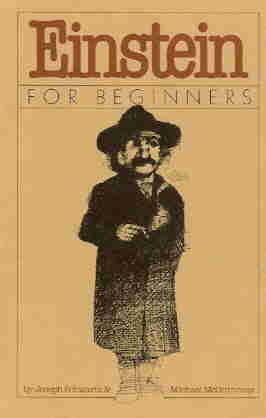Surprisingly, this book is not particularly clear. Cute cartoons and comments and references to "Albert" don't make for clarity. Light is central to Einstein but the authors don't tell us why we should care at all about 'light'. The authors reference Einstein's illustration of himself riding along a light wave at the speed of light, holding a mirror, observing that the light from his face wouldn't be able to catch up with the mirror. Here the reader might be puzzled about where the light on Einstein's face comes from and what it has to do with a mirror. The book is also filled with more than a few mathematical formulations (algebra and calculus) that were not helpful. Einstein for 'beginners' is probably a relative term.
From this book we know that space and time are not independent, fixed, 'absolute' as Newton thought, and we know that space and time are tied to the speed of light, which Einstein saw as 'absolute' (not variable, as space and time are). But from here it gets fuzzy. If light's speed is constant, then the distance (and time for light to travel) between two points will vary depending on where these two points are located. Shorten the distance, and time is shortened. Lengthen the distance, and time is lengthened. Time and space might be best thought of not as things that we move through or across, but as measurement concepts: Time is speed (velocity) times distance (space). Understanding this depends, again, on the role of light and why it is significant. Whether space and time are more than 'measurement' concepts is also not clear. Interestingly, while reading this, a thought flashed through the mind wondering that if one moves at the speed of light, does space end and time stop?
Relative to light, there's little discussion about Einstein's theory of gravity. Force (external push and pull) is referenced as an "interaction" as another term for 'force'. Gravity is commonly referred to as an attractive force between two bodies (unlike electromagnetic positive and negative interactions). What is interesting is how this understanding is consistent with inertia (the bigger the mass, plus distance, the harder it is to get a body to move). Inertia can be seen as a counter force, a resistance to being pulled by another body. In other words, it also seems to involve a positive (attraction) and negative (resistance) dynamic.
The book ends with an outline of Einstein's political perspective (socialist) which, given the centrality of Einstein's scientific views, seems puzzling to include in this book until one reads the acknowledgments and learns that this "Beginners" series is intended in part to critique science in capitalist society.

